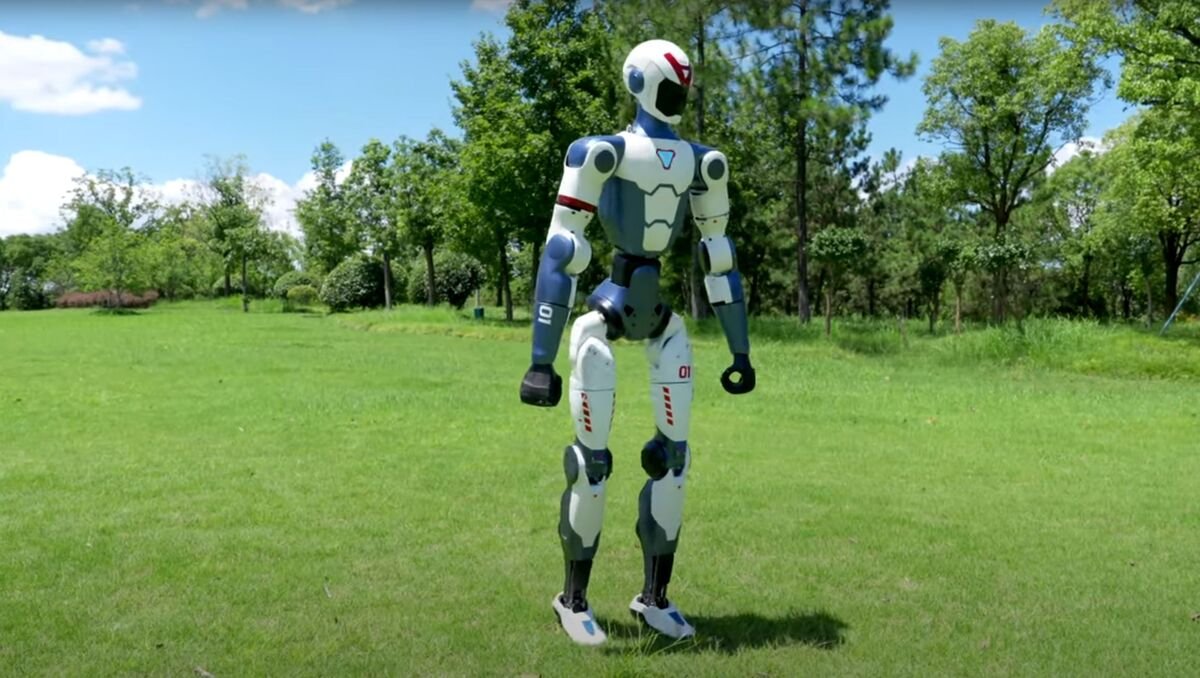AI Insights
China’s Unitree R1 Is a Humanoid Robot Costing Less Than $6,000

Unitree Robotics is marketing one of the world’s first humanoid robots for under $6,000, drastically reducing the entry price for what’s expected to grow into a whole wave of versatile AI machines for the workplace and home.
The startup, among the frontrunners in Chinese robotics, on Friday announced its R1 bot with a starting price of 39,900 yuan (or $5,900). The machine weighs just 25kg and has 26 joints, the company said in a video posted to WeChat. It’s equipped with multimodal artificial intelligence that includes voice and image recognition.
AI Insights
Artificial Intelligence Stocks To Follow Now – August 30th – MarketBeat
AI Insights
Detects heart disease in 15 seconds: AI-powered stethoscope developed in Britain

A team of researchers confirms the potential of a new type of stethoscope; specialists say that the new device, with the help of artificial intelligence, can save more lives. This is reported by UNN with reference to Euronews and Spiegel.
Details
Artificial intelligence is increasingly penetrating various sectors and changing what previously seemed untouchable. A classic situation, unshakable for many decades during a patient’s visit to the doctor: the doctor holds a stethoscope to the patient’s chest and listens, among other things, to the heartbeat.
For reference
The hearing aid, invented in 1816 by the French physician René Laennec, has been a symbol of medicine for centuries. Always around the neck, this “simple” instrument has accompanied generations of doctors, performing the indispensable mission of examining the heart and lungs.
With the help of an AI-stethoscope, everything is probably better now… Or faster
According to new data, researchers from the United Kingdom have developed an artificial intelligence (AI)-based stethoscope. The new device, according to scientists, can detect three heart diseases in just 15 seconds.
Note:
- smart stethoscopes (which transmit body sounds to software) are relatively new;
- researchers are now exploring the potential of such devices.
And now a wonderful new update has been announced, which, by the way, was recently presented at the annual congress of the European Society of Cardiology in Madrid.
How the examination was conducted using the new technology
The study was conducted by Imperial College London and Imperial College Healthcare NHS Trust.
The goal is to confirm that innovative stethoscopes can detect heart failure, heart valve disease, and cardiac arrhythmias significantly better than traditional methods.
For the study, over 12,000 patients from 96 medical facilities were examined using AI stethoscopes from the American company Eko Health. Their data was then compared with data from patients from 109 medical facilities where this technology was not used.
“Doctor in your pocket”: UK launches AI-powered medical chatbot25.06.25, 21:14 • 3852 views
According to the study, people with heart failure were 2.33 times more likely to be diagnosed with the disease within the next twelve months than those in the control group.
- atrial fibrillation, which can increase the risk of stroke, was detected in the AI-assisted group even 3.5 times more often;
- heart valve diseases were detected 1.9 times more often within twelve months.
Comment
Our study shows that it is now possible to detect three heart diseases in one session
Addition
The possibility of an undesirable effect in unfortunate circumstances cannot be ruled out.
Healthy people, for example, may be mistakenly diagnosed with heart problems.
Researchers emphasize:
The AI-based stethoscope should not be used for routine examinations, but only for patients who already have a suspected heart condition.
Recall
Researchers at Cambridge University have found that common aspirin can enhance the immune system’s ability to fight cancer spread.
AI Insights
The good and bad of machine learning | Artificial intelligence (AI)

Imogen West-Knights is absolutely right about us losing our brain power to the artificial intelligence bots (ChatGPT has its uses, but I still hate it – and I’ll tell you why). I too believe creative imagination is a muscle, which needs its exercise. She is also right that it can revolutionise scientific endeavour. My field of weather forecasting will soon be revolutionised by machine learning – a type of AI – where we recognise enough past weather patterns so that we can predict what weather will be coming. But writing best-man speeches, leaving speeches for work colleagues, letters to a dear friend? Do we really want to dissolve into brain-lazy folk who use AI to be the understudy to our own emotions?
If I say “I love you” to someone, would they like to hear it from me or a bot? There is also another concern: AI output has no audit trail, no clues to its source. Its source is the wild west. Anyone – good, bad, indifferent – can feed into it, program it, bias it. If, as you say Imogen, you do end up in the woods in an “analogue manner” with your ability to think intact, I’ll happily join you. Hopefully others will too.
Murray Dale
Hayle, Cornwall
Imogen West-Knights shares her hatred of offloading to ChatGPT the tasks that make us human. And while I share her concerns (I couldn’t have put them better myself), there is an additional one that troubles me: if students go through their entire school lives with this all-knowing and all-solving technology at their fingertips, how will their critical thinking skills develop?
Students in literature class are not given books such as The Great Gatsby so they can regurgitate the plot 20 years later at a dinner, but rather so that they can understand the interconnection of class disparities, wealth and the social atmosphere after the first world war, and so they can trace parallels with the present day.
They learn multivariable calculus not because they will need it to buy groceries but to make their brains strong and malleable, so that grasping and implementing new concepts and ideas will become easier, whatever the subject.
And they don’t learn history so they can repeat over and over “Victoria 1837, Edward VII 1901, George V 1910, Edward VIII 1936, George VI 1936, Elizabeth II 1952”, but to understand how sequences of events have led to wars, legislative changes and economic crises, and can do so again.
Technologies that make work easier have always been seductive, and always will be. AI usage is already rampant in secondary schools and universities.
But as ChatGPT turns three years old in a few months, preschoolers are also starting to go to kindergartens. And I wonder how in the years to come we will ensure that their answer to everything is not “I will ask ChatGPT.”
Ignacio Landivar
Berlin, Germany
-

 Business3 days ago
Business3 days agoThe Guardian view on Trump and the Fed: independence is no substitute for accountability | Editorial
-
Tools & Platforms3 weeks ago
Building Trust in Military AI Starts with Opening the Black Box – War on the Rocks
-

 Ethics & Policy1 month ago
Ethics & Policy1 month agoSDAIA Supports Saudi Arabia’s Leadership in Shaping Global AI Ethics, Policy, and Research – وكالة الأنباء السعودية
-

 Events & Conferences3 months ago
Events & Conferences3 months agoJourney to 1000 models: Scaling Instagram’s recommendation system
-

 Jobs & Careers2 months ago
Jobs & Careers2 months agoMumbai-based Perplexity Alternative Has 60k+ Users Without Funding
-

 Funding & Business2 months ago
Funding & Business2 months agoKayak and Expedia race to build AI travel agents that turn social posts into itineraries
-

 Education2 months ago
Education2 months agoVEX Robotics launches AI-powered classroom robotics system
-

 Podcasts & Talks2 months ago
Podcasts & Talks2 months agoHappy 4th of July! 🎆 Made with Veo 3 in Gemini
-

 Podcasts & Talks2 months ago
Podcasts & Talks2 months agoOpenAI 🤝 @teamganassi
-

 Mergers & Acquisitions2 months ago
Mergers & Acquisitions2 months agoDonald Trump suggests US government review subsidies to Elon Musk’s companies





















